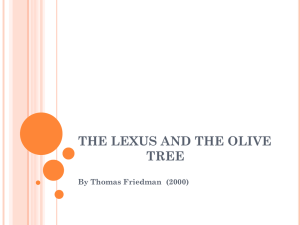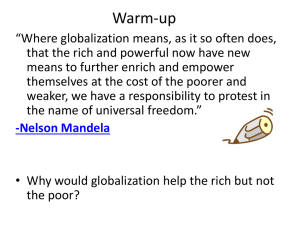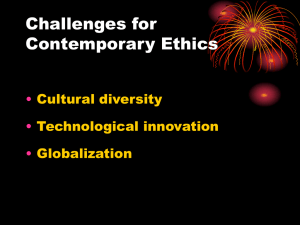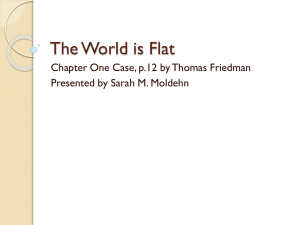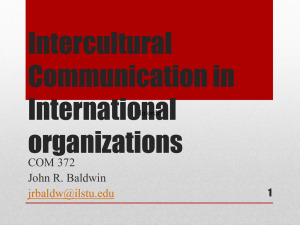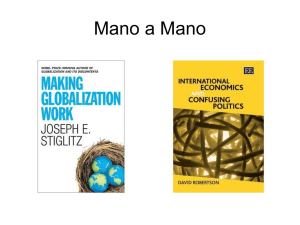digital divide
advertisement
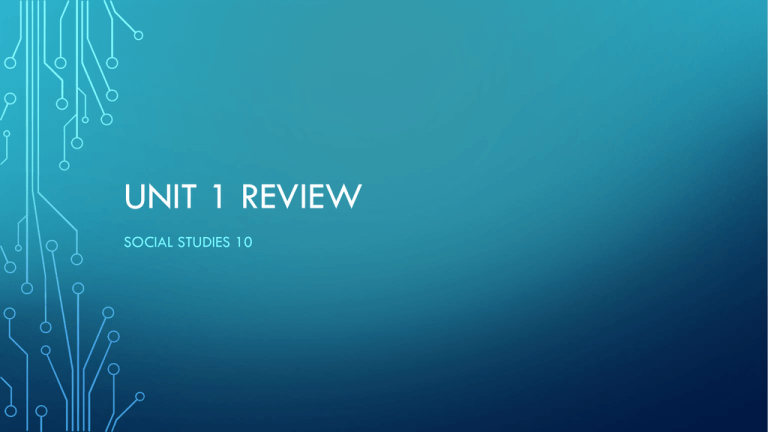
UNIT 1 REVIEW SOCIAL STUDIES 10 GLOBALIZATION AND IDENTITY • Globalization influences who you are and shapes your community in ways you may not have noticed. • Consider some of the factors that shape who you are: • • • • • • • • • Family Heritage History Language Traditions Wealth Religion Peers Etc. GLOBALIZATION HAS AN IMPACT ON ALL OF THESE THINGS! GLOBALIZATION AND IDENTITY • Technology has become an important part of our personal identities. Technology helps us connect with people at any time which is an important part of personal identity. At the same time technology connects us to a wider community making it a part of collective identity • The technology we use is produced and marketed by major transnational corporations (Apple). Production of our devices takes place all over the world, making us dependent on raw materials and labor forces in places we will likely never visit. WHAT ARE SOME FORCES OF GLOBALIZATION? • Trade • Transportation • Communication • Media TRADE AS A GLOBALIZING FORCE • Trade is not a new phenomenon. • No human society has ever had everything that it needed, forcing them to search for other sources of goods. The Silk Road connected Europe to Asia during the Middle Ages. The routes were long and treacherous making trade very expensive. TRADE AS A GLOBALIZING FORCE • Trade motivates contact between societies and cultures. • Typically the fist level of contact between cultures is for trade. • There is a common human desire to fulfill our wants and needs and therefore a common desire to trade. • As a result of this contact culture and ideas were exchanged, as well as goods (Classical ideas spread to Europe via trade with the Islamic empires. TRADE AS A GLOBALIZING FORCE • Today international trade is dominated by Transnational (multinational) corporations. • A transnational corporation is any company that is based in one country while developing and manufacturing its products, goods, and services in more than one country. TRADE AS A GLOBALIZING FORCE • Transnational Corporations are often seen to be driving the process of globalization. • The vast majority of products and capital that moves around the world everyday is done through transnational corporations. • There are benefits to this system. • • Many jobs are created around the world We have easy access to a wide variety of goods and services. TRADE AS A GLOBALIZING FORCE • There are also many disadvantages • “McJobs” - A low-paying job that requires little skill and provides little opportunity for advancement • • • • Outsourcing- Jobs leaving to go to other countries Exploitation of the poor Exploitation of the environment Lack of accountability (little government regulation) FREE TRADE AND GLOBALIZATION FREE TRADE AND GLOBALIZATION FAIR TRADE AND GLOBALIZATION TRANSPORTATION AS A GLOBALIZING FORCE • Transportation of people, goods, materials, and services is dependent on technology. • The silk road required the domestication of camels and the use of carts to be effective. • Modern trade routes require sophisticated technology like rail systems, container ships, and aircraft. SHIPPING AND GLOBALIZATION COMMUNICATION TECHNOLOGY AS A GLOBALIZING FORCE • The faster, and cheaper communication gets the more interdependent the world becomes • Revolutions in communication include discoveries such as writing, printing press, mail systems, telegraph, shortwave radio, telephone, satellites, computers, and internet. • Notice that each new discovery made global communication easier, cheaper, and faster, allowing people around the world to interact on a more regular basis. THE MEDIA AS A GLOBALIZING FORCE • The last 20 years have seen a revolution in the media called “convergence”. Radio Newspapers Music INTERNET Books Television THE MEDIA AS A GLOBALIZING FORCE • Most media forms can now be funneled through the internet, giving us near instant access to information around the world. • An issue now is who controls the content? Publically accessible and collaboratively produced content There are two opposing forces. INTERNET Privately produced and copy written content MEDIA CONCENTRATION Note the dropping number of corporations that control a majority of the media in the United States. MEDIA CONCENTRATION Media concentration is an issue of ownership. If most of our media is owned by a few powerful corporations do they then have significant control over how we think? THE DIGITAL DIVIDE • It is a fact that most people in the world do not have access to a phone, let alone an internet connection. • This digital divide can have a huge impact on group and individual identity. How? • “Globalization, as defined by rich people like us, is a very nice thing…you are talking about the internet, you are talking about cell phones, you are talking about computers. This doesn’t effect two-thirds of the people of the world.” Jimmy Carter. THE DIGITAL DIVIDE THE DIGITAL DIVIDE • Statistics for 2012 • North America- 78.6% • Australia/Oceania- 67.6% • Europe- 63% • Latin America and Caribbean- 42.9% • Middle East- 40% • World Avg (based on world population)- 34.3% • Asia- 27.5% • Africa- 15.6% DIVERSITY AND GLOBAL MEDIA CONCENTRATION • The media has the power to reach billions of people. • On one hand it provides us with glimpses of cultures and ideas we don’t normally come into contact with, increasing and supporting diversity. • On the other hand media concentration means these cultures and ideas are being interpreted through fewer and fewer lenses, limiting our ability to consider multiple perspectives and hindering diversity. TECHNO-ISOLATION • Some believe that technology increases our connections online but actually decreases our connections in real-life, often turning us into “high-tech hermits”. • This often leads to a reduced sense of local community. IDENTITY AND MEDIA COVERAGE • If most of the important information we receive about the world comes through the media then we can say that the media has a substantial impact on your identity. • An example • After 9/11 there were large demonstrations in Muslim nations denouncing the attacks, in other nations there were demonstrations celebrating them. Some media sources focused on the denouncements whole others focused on the celebrations, a few tried to show both. The media source consumed by people often determined their response to Muslim people after the attack. IDENTITY AND MEDIA COVERAGE IDENTITY AND MEDIA COVERAGE DIVERSITY AND THE DOMINANCE OF AMERICAN MEDIA • The dominance of the American pop culture industry has generated discussion around the nature of globalization. • Some consider it to be a global movement that promotes diversity and can be called Universalization. • Others consider it a homogenizing force (making everyone the same) that can actually be called Americanization. DIVERSITY AND THE DOMINANCE OF AMERICAN MEDIA Rank Title Company Gross (U.S. $) 1 The Avengers Buena Vista $623,357,910 2 Dark Night Rises Lionsgate $448,139,099 3 The Hunger Games 20th Century Fox $408,010,692 4 Skyfall Sony $303,460,116 5 The Hobbit Warner Brothers $298,481,792 6 Twilight: Breaking Dawn Pt. 2 Summit $291,437,864 7 Amazing Spider-Man Sony $262,030,663 8 Brave Buena Vista $237,283,207 9 Ted Universal $218,815,487 10 Madagascar 3 Paramount $216,391,482 GLOBALIZATION’S CHALLENGE TO IDENTITY • Globalization does present some challenges to cultural identity. • Homogenization: A process where the differences between peoples and cultures are, over time, erased, making people increasingly similar. • Acculturation: Is when two different cultures come into contact and changes occur in one or both of the cultures. These changes can be positive or negative. • Accommodation: involves accepting and creating space for one another. This can often lead to cultural change as the two cultures mix. This can also be called hybridization. • Assimilation: Involves the erasure of one culture by another more dominant culture. This can happen accidently or it can be done on purpose. GLOBALIZATION’S CHALLENGE TO IDENTITY • In order to prevent these types of challenges from occurring many companies try to be culturally sensitive by bringing various cultural perspectives into their programming. This process is called hybridization. GLOBALIZATION AND CULTURAL REVITALIZATION • Despite the challenges to cultural diversity globalization does provide some opportunities to cultural groups to revitalize themselves in the face of pressures to conform. • For example modern communications technology makes it easier for small cultural groups to educate the world about who they are. It also allows them to publicize ways in which they are being marginalized in society. • This process of Cultural Revitalization can be seen most clearly on the internet where groups are able to bypass mainstream media and publish ideas from their perspectives. AFFIRMING IDENTITY: LANGUAGE • English is quickly becoming the common language of the world and is replacing traditional languages at a rapid pace. Why is this? • During the age of imperialism (next unit) Britain dominated the planet, seeding English in many places around the world. This also accounts for why French and Spanish are spoken all over the world. • In the present day the richest and most powerful nations and companies on the planet are English speaking. As a result English dominates the internet, media, pop culture, diplomacy, and business. Can this be more evidence for Americanization? AFFIRMING IDENTITY: GOVERNMENT’S ROLE • How has the Canadian government attempted to protect cultural and linguistic identity? • Multiculturalism Act, 1971 • Official Languages Act (Bilingualism), 1969 • Teaching aboriginal languages in schools • Cultural Content Laws


